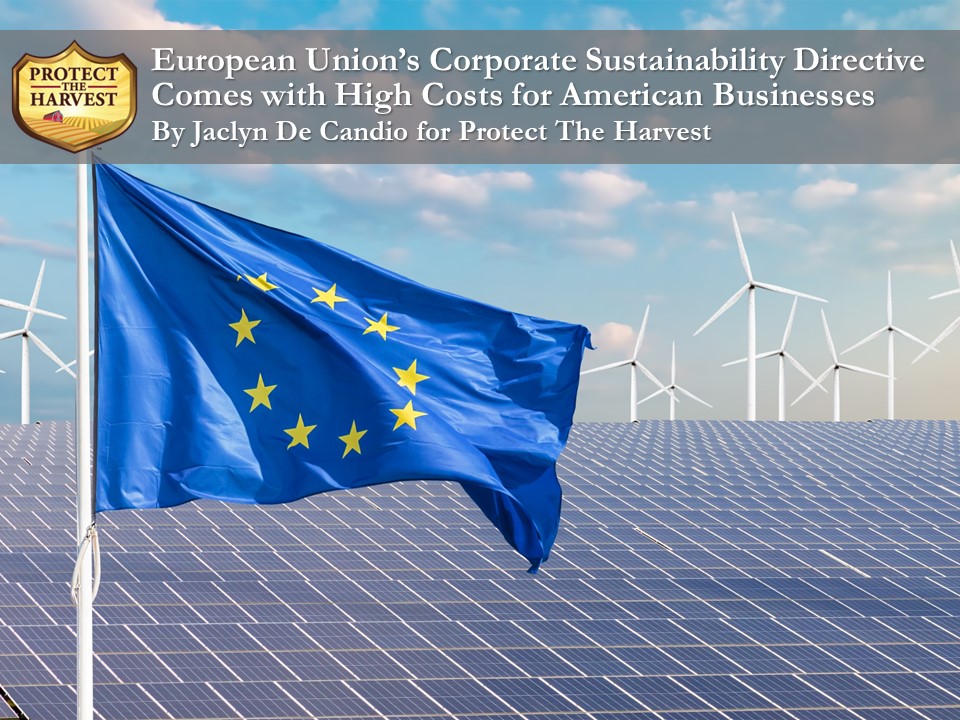By Jaclyn De Candio for Protect The Harvest
Tightening its grip on globalist-oriented climate policy, the European Union (EU) recently adopted a Corporate Sustainability Due Diligence Directive (CSDDD) that mandates qualifying businesses operating in the EU to comply with a stringent set of environmental, social, and governance (ESG) regulations under threat of legal action for non-compliance. The CSDDD governs businesses that both operate in the EU and U.S.-based firms with annual revenue over €450 million that trade with EU countries. Anyone who is rational will understand why CSDDD has not met resistance from the Biden administration.
The American Bar Association (ABA) explains the CSDDD’s direct links to the United Nations (UN): “The Directive will in effect convert the nonbinding obligations of the UN Guiding Principles on Business and Human Rights and the frameworks in the OECD Guidelines for Multinational Enterprises on Responsible Business Conduct and OECD Due Diligence Guidance for Responsible Business Conduct into legal obligations binding on companies that fall within the CSDDD’s scope (“in-scope” companies or MNEs).”
Links to UN-inspired Globalism
According to the European Commission, the directive’s goal is “Fostering sustainable and responsible corporate behavior for a just transition towards a sustainable economy.” However, the reality is more complex and, arguably, totalitarian in its goals.
The CSDDD requires qualifying businesses to take significant actions to reduce and reverse biodiversity loss, limit water and land use/consumption, prohibit specific types of “disinformation,” ensure labor union rights, and implement climate transition plans to eliminate the use of fossil fuels. This is only a partial list of CSDDD’s requirements, but it’s enough to trigger alarm bells.
Non-compliance could lead to massive fines — as much as 5% of a company’s global net turnover (revenue). Additionally, companies violating CSDDD’s mandates could face lawsuits from individuals or activist groups for alleged damage.
The ABA further cautions that the Directive’s importance should not be underestimated, as it will transform the rights outlined in various international agreements – previously binding only on state parties unless incorporated into domestic law – into legally enforceable obligations for MNEs across all twenty-seven EU member states.
Climate Regulation Overload
So, what’s under the CSDDD’s watchful eye? The goal is control. It is aimed at limiting resource consumption and dutifully, blindly, and mindlessly following “climate transition plans.”
While there are numerous human and child labor rights included in the CSDDD, most of the draconian mandates are found in the environmental and sustainability requirements. These include in-scope companies being obligated to implement a transition plan to reduce greenhouse gas emissions that fall in line with the Paris Agreement’s goal of limiting global warming to 1.5°C above pre-industrial levels and the EU’s “net zero” targets. It also requires businesses to prevent any measurable environmental degradation from their global operations, with details left to the individual countries to decide. Each EU country will enact its own laws within the CSDDD framework by July 2026.
CSDDD raises many critically important questions that currently remain unanswered, according to the ABA.
Alarmingly, CSDDD’s requirements extend throughout a company’s entire supply chain. For example, a U.S. fast food chain operating in EU countries would be required to force Idaho farmers growing potatoes for French fries sold in EU restaurants to comply with CSDDD’s mandates. Doing so would preempt U.S. regulations and result in the EU’s control of American food producers.
The EU and UN Intent Should Not be Underestimated
The UN’s Industrial Development Organization (a specialized agency within the UN aimed at promoting industrial development for poverty reduction, inclusive globalization, and environmental sustainability) Director General Gerd Müller is quite enthusiastic about this effort. Gerd stated: “The next step is a binding global set of rules that includes companies worldwide – as Director General of the United Nations organization for sustainable economic and industrial development, I am committed to this.”
CSDDD implementation is a few years away, with some transitional time provided. However, now is the time for American companies with a business presence in EU countries to remain vigilant and demand the U.S. push back on this non-scientific, fact-absent, totalitarian control grab.
Because this impacts global supply chains, it means companies doing business in the EU, even if they have segments of their supply chains in the U.S., will be forced to comply on their home soil as well as abroad. This illustrates another effort to force global control by using climate concerns as a rationale to push the needle further toward totalitarianism.
Keeping American businesses prosperous should not involve them being forced to comply with foreign regulations that apply to their U.S. operations. American companies need to actively engage with policymakers, industry groups, and international forums to ensure that their interests are protected and that they are not burdened by ill-conceived foreign regulations. By doing so, they can help shape a fair and balanced approach to global sustainability that recognizes the unique challenges and contributions of businesses worldwide.
U.S. businesses should stay informed, be proactive in their compliance strategies, and advocate for reasonable and fair regulations that do not compromise their competitive edge or operational integrity. The time to act is now, before the CSDDD and similar directives become a binding reality that could significantly impact their operations, profitability, and freedoms.



